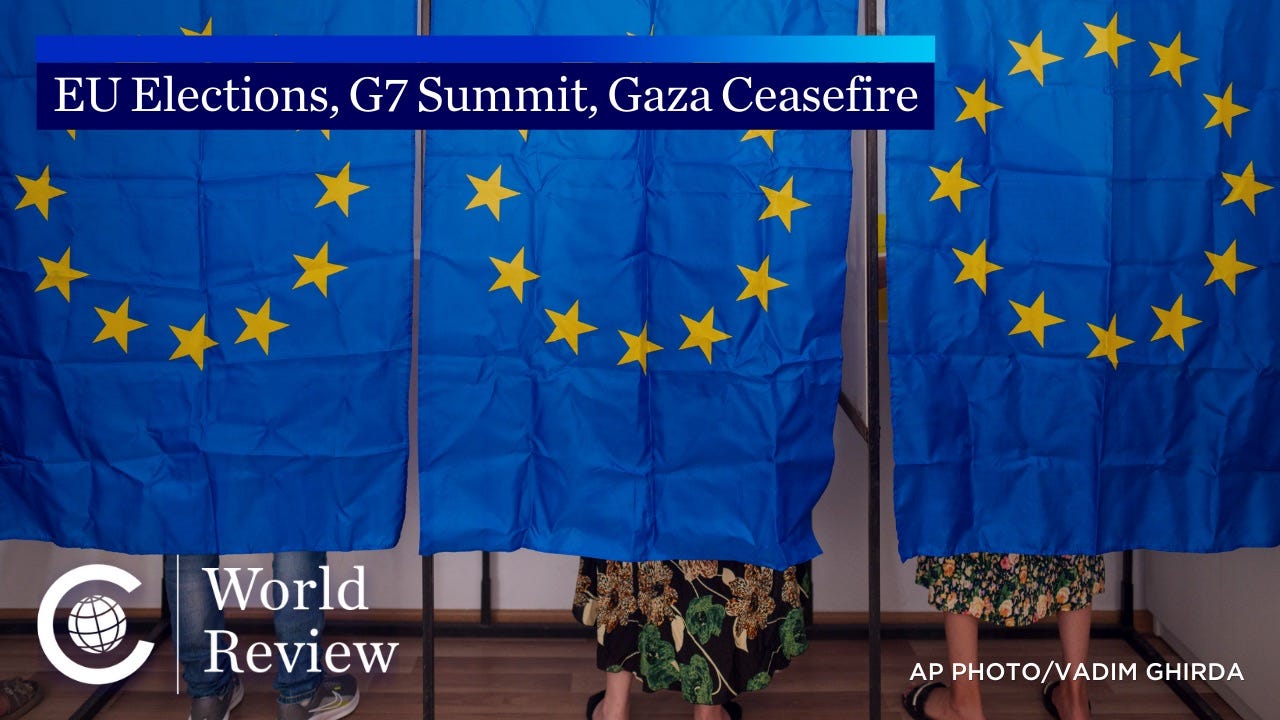World Review: EU Politics and NATO at 75
A brief synopsis of this week's show
Each Friday morning, I host a video podcast called “World Review with Ivo Daalder” where three journalists from major news outlets around the world join me in discussing the latest global news stories of the week.
This morning, June 28, I was joined by Sylvie Kauffmann of Le Monde, Giles Whittell of Tortoise Media, and Matt Kaminsky of Politico.
“World Review is always fascinating. I love the fact that you can get journalists from around the world to participate since zoom is the medium.”
— A Subscriber to America Abroad
While I encourage you to watch or listen to the episode (and subscribe wherever you get your podcasts!), here are a few interesting things I took away from our discussion:
The big story this morning was the presidential debate Thursday night between President Biden and ex-President Trump. Matt called it “the most clarifying 90 minutes in American politics this year, and arguably ever.” Biden didn’t appear up to the task of President for another seven months and four years. Trump emerged not only as the winner of the debate, but as the clear favorite to win the elections. Seen from abroad, the result was deeply worrying for many. Sylvie reminded everyone that in Brussels EU leaders were gathering to decide on who will get the top jobs in the Union and suggested that their desire to “Trump-proof” the EU played a big part in their choices. The talk in Britain and elsewhere was on how this could continue — and whether there was a chance that Biden might withdraw his candidacy and let a younger person fight the election that he and his aides have long painted as the most consequential for American democracy in a long time, if not ever.
In France, meanwhile, voters will again go to the polls on Sunday — three weeks after giving the far-right party a resounding victory in the European Union elections. Emmanuel Macron gambled that the French people would have their own clarifying moment by uniting against the extremes on the left and right and reinforcing the center of French politics — his center. He miscalculated badly, Sylvie argued. The right is rising in the polls and the left quickly united under a single banner, together squeezing the center. Polls suggest the National Rally party of Marine Le Pen will get close to a parliamentary majority, if not an outright majority, which would bring the 28-year-old president of the RN, Jordan Bardella, to the premiership. That would lead to an experiment in cohabitation that would be profoundly different than what occurred decades ago, bringing to power a party that differs with Macron on almost every issue — including Europe and Russia. Should the RN fail to get a majority, Macron is left with even less clarity. There is talk of a government of technocrats being appointed, but Sylvie pointed out that unlike in Italy a few years ago, “France does not have a Draghi,” referring to the former EU Central Bank head who governed Italy successfully for several years.
While the outcome is uncertain in the French elections, the victor in the British election is already known, Giles argued. Labor will return to power for the first time since Brexit. The only question is whether its majority will be around 200 seats or an unprecedented 300 seats. For the sitting Tories, “the only question is whether it will be a shellacking, disaster, or catastrophe,” possibly wiping out nearly all of its seats. While the election isn’t about Brexit, Brexit is very much the subtext of the elections. One reason the Tories are doing so badly is that they are being challenged by the pro-Leave Reform Part of Nigel Farage, whose votes will eat into those for the Conservatives and shift many seats to Labor or the Liberal Democrats. The other reason is that Labor wants to restore economic growth and will try to do so by reducing many of the barriers to trade with the EU. The trick will be to do that without getting back into the customs union or the single market, which Labor’s leader Keir Starmer has said he wouldn’t do.
Finally, the NATO Summit celebrating the alliance’s 75th anniversary is in two weeks and there are reasons to celebrate. In the ten years under the outgoing secretary general’s leadership, NATO has become stronger and more united in its determination to confront a rising Russia. In 2014, there were three countries spending two percent of of their GDP on defense; today there are 23 — and all of Europe together spends more than two percent. Finland and Sweden have joined the Alliance, making it that much stronger. Even so, Matt underscored, Trump’s transactional view of alliances is creating doubts in Europe about whether a Trump-led America would come to Europe’s aid if it were attacked — doubts reinforced by Trump’s reiteration during the debate of an earlier remark that he would not come to the defense of NATO countries that did not meet their obligations. As NATO leaders gather in Washington, they will have a hard time escaping the dark shadow Putin and the prospect of Trump’s return have cast over the alliance.
That’s it for my quick takes of this week’s episode here on America Abroad. To get the full flavor, please listen to the episode itself.



